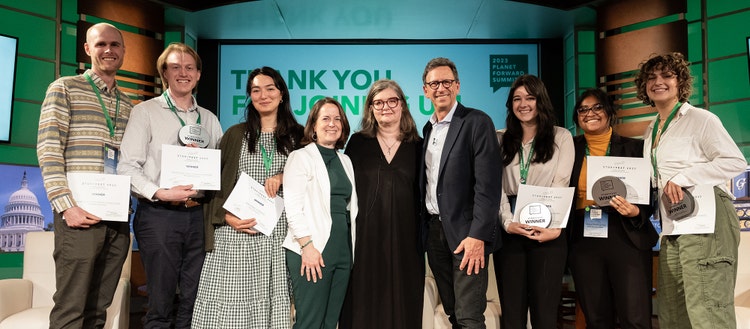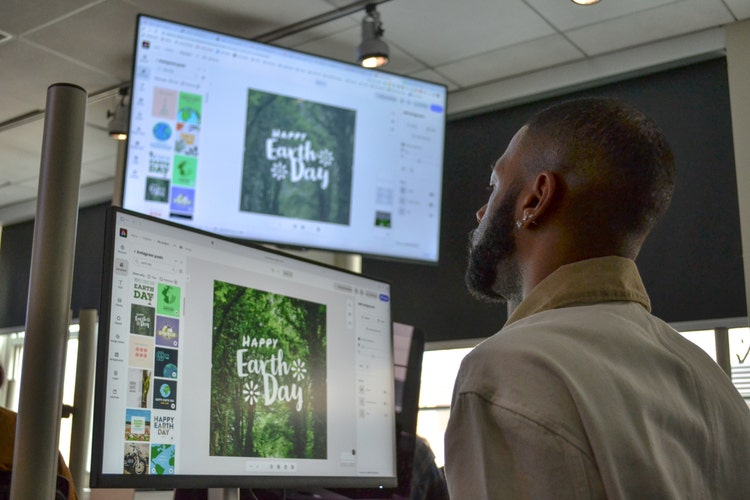Celebrating student storytelling with Planet Forward at Adobe Creative Campus George Washington University

For 15 years, Planet Forward has shared and celebrated environmental storytelling by college students around the globe. Founded as a project hosted at the George Washington University (GW) School of Media and Public Affairs, Planet Forward invites students from any university to submit stories that shine a light on issues affecting people and the planet. As an Adobe Creative Campus, GW encourages students to use Adobe apps to communicate ideas creatively. This includes work done for Planet Forward, where students use Adobe Express to create visually rich stories or Adobe Premiere Rush for compelling videos.
“One thing that I’ve noticed over the past 15 years is that anxiety around the climate crisis has increased for younger generations of students,” says founder Frank Sesno, Emmy Award-winning CNN journalist and professor and director of Strategic Initiatives at the School of Media and Public Affairs at George Washington University. “But they also appreciate the approach that Planet Forward takes to highlight ideas, innovations, and actions from people around the world. Students say that it gives them hope.”
Since its inception, Planet Forward has seen more than 4.4 million visits to its website and hosted more than 24,700 participants at its annual Planet Forward Summit, sponsored in part by Adobe, with participants coming from more than 145 colleges and universities around the world. Every year, the organization also celebrates the most compelling student-told stories in the Storyfest Awards. For the 2023 Storyfest Awards, Planet Forward received 132 entries competing in five categories: Best Science Narrative, Best Use of Science or Data, Best Scalable Innovation, Most Compelling Character, and Most Creative. The 37 finalists represent some of the most interesting, informative, and creative examples of visual storytelling this year.
“Students can use whatever platform they want to create their stories, but we encourage Adobe Express,” says Sesno. “I view it as the poster child for visual storytelling because students can really think about the best way to tell their story. Maybe they want to include video or audio, visualize data, include a map, or illustrate the narrative with a photograph. Even if it’s primarily text, they can use negative space to highlight a powerful quote that challenges the reader. There’s power behind visual storytelling as our Storyfest 2023 finalists and winners show.”

Learning from Indigenous knowledge
Jing-ning Hsu, a recent journalism and statistics graduate from GW, was recognized as a finalist in the Most Creative Story category for Piscataway Park: Reconnecting with nature for sustainability. The story profiles Anjela Barnes, a Piscataway woman who offers insights into how lessons from her Indigenous agricultural practices can strengthen the relationships between people, land, and water.
Using Adobe Express, Hsu combined photographs, illustrations, and text to share the story of Barnes and Piscataway people. “I like how accessible and straightforward Express is for beginners,” says Hsu. “I wanted to appeal to my readers emotionally by having strong visuals that remind them of the greatness of nature, and I believe that I accomplished that with Express. I look forward to exploring how data visualization and multimedia storytelling can help me achieve my goals in environmental journalism.”

Stewardship of the Santa Cruz River
As a third-generation native of Tucson, Halley Hughes has always been aware of the role that the climate plays in her desert hometown. Her video exploring trash and the impact that it has on the Santa Cruz River, Reconciliación en mi Río, was selected as the Most Creative Story for Storyfest 2023.
“I question how restoration can work as a solution on rivers that can never be restored to their past state,” she says in her video. “Maybe instead of fixing the river, we can reconcile our relationship with it, take responsibility to protect the river that gives us life.”
While Hughes had done work with Adobe Photoshop, this was her first video project. “I didn’t have any formal training in Premiere Pro, but there were so many helpful tutorials from Adobe that it didn’t take me long to figure out how to edit things together,” says Hughes. “For a lot of people, climate change feels far away, so I wanted to use video to communicate the impact of trash on the environment. I’ve learned a lot working with Planet Forward, but the biggest thing for me is knowing that there are other people out there doing work that makes a difference.”
Storyfest 2023 Winners
Other winners from Storyfest 2023 are:
- Best Scalable Innovation: In Colorado, the soil beneath solar panels is ripe for growing crops This story by Gabe Allen & Tyler Hickman from The University of Colorado, Boulder highlights how “agrivoltaics,” a land-use model that combines agriculture with solar power, has the potential to maximize space to power and feed the future.
- Best Science Narrative: Solutions on the Half-Shell: Healing Florida’s waters with clams University of Florida student Katie Delk shares the story of a threatened coastal ecosystem from the perspective of the community directly impacted.
- Most Compelling Character: Nebraska Sandhills hint changing tides in agriculture
This story from Vidya Muthupillai, a student at George Washington University, explores the future of regenerative agriculture by focusing on the efforts of one experienced rancher in Nebraska. - Best Use of Science or Data: Perennial grains are the future of sustainable agriculture Michigan State University student Cassidy Hough walks listeners through the history — and future — of crop engineering as part of her podcast “The Food Fix.”
- Planet Forward Staff Award: Reinventing a sustainable crab fishery
With so many excellent stories to choose from, Planet Forward decided to give its inaugural Planet Forward Staff Award to a story that defied categorization. Sachi Kitajima Mulkey, a student at University of California, Berkeley, created beautiful illustrations to explore how crab fishers are innovating to maintain their livelihoods while protecting whales.
“It has been a remarkable and powerful experience to see how Adobe’s digital tools and the creative license they provide combine with Planet Forward’s mission to do compelling storytelling around climate change and sustainability,” says Sesno. “The power of visual storytelling to convey the urgency of the challenge is breathtaking. And it's precisely what we need to inform and engage people as the planet confronts unprecedented problems, including intense heat, thick smoke, and destructive rainstorms.”
Congratulations to this year’s Storyfest finalists and winners! We look forward to seeing how all Planet Forward participants will use visual storytelling to share new stories next year.
Learn more about Planet Forward and how it uses Adobe Express to share stories about the planet here.
Students can further engage with Planet Forward here and faculty here.